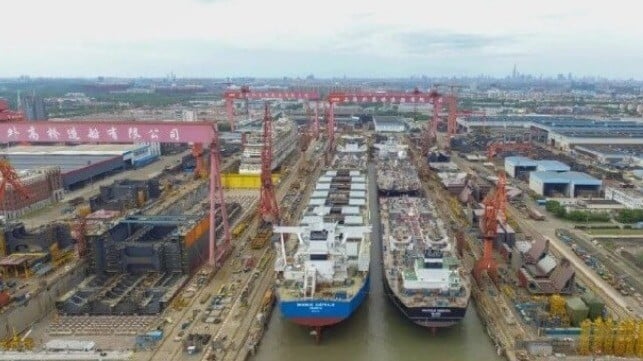China Trounces Korea Taking Three-Quarters of Shipbuilding Orders in April

The competition for new orders in the shipbuilding market continues to grow with Chinese shipyards pulling dramatically ahead of the South Korean yards for the second consecutive month. Analysts highlight that it illustrates the differences in strategies between the two countries, a position that China is likely to expand on going forward.
Clarkson Research released the latest monthly figures showing the growing divergence. Total orders they calculated reached 4.71 million compensated gross tons for a total of 121 vessels. Overall, the market was up 24 percent year-over-year.
The two countries typically dominate the market with some months a nearly even split in orders or at the beginning of 2024 South Korea was booking larger total orders. However, in April the Chinese yards booked 76 percent of the total orders. Clarksons calculates a total of 91 ships representing 3.58 million CGT. South Korean yards by comparison only received orders for 13 ships or just 670,000 CGT. That represented only a 14 percent market share. By comparison, in March, Chinese yards received 43 percent compared to the South Korean’s 38 percent.
The global order book Clarksons reports stands at 129.9 million CGT, with the backlog down just one percent in April. Chinese yards hold 50 percent of the orderbook (64.9 million CGT). South Korean yards have 30 percent of the orderbook (39 million CGT).
The Export-Import Bank of Korea’s Overseas Economic Research Institute highlights that South Korea’s industry is following a selective order-taking strategy. The yards are focusing on high-value new builds as well as emerging technologies for eco-friendly and technologically advanced vessels. In the first quarter of 2024, just over half of the orders received by the South Korean yards were for liquified petroleum gas (LPG) carriers. The emerging category of very large ammonia carriers was just over 20 percent of the orders. Korean shipbuilders failed to take any orders for VLCCs last year and are now seeing a slowing in containership construction orders.
Analysts are questioning South Korea’s strategy. They note that orders for LNG carriers which have been among the highest-priced vessels have likely peaked driven by the 104 orders placed mostly with the Korean yards linked to Qatar’s expansion. Qatar Energy reported it has completed the second tranche of its orders signing a massive contract with China for 18 Q-Max carriers, the largest LNG vessels.

that matters most
Get the latest maritime news delivered to your inbox daily.
China’s yards have built large production capacities and are very competitive on price. Analysts highlight that China is now targeting more of the mid-sized vessel construction orders previously led by Japanese yards. In addition to the Q-Max order last month, Chinese yards received the only large orders for new containerships in 2024. China’s yards are also breaking into new technologies including methanol-fueled vessels.
All of this comes as the United States announced it would start a trade investigation into the Chinese government’s support of its shipbuilders. Five U.S. labor unions lead the protest alleging unfair competition and subsidized steel helping China to build its dominance in shipbuilding. They are calling for tariffs and more U.S. government support to rebuild domestic shipbuilding capabilities.
